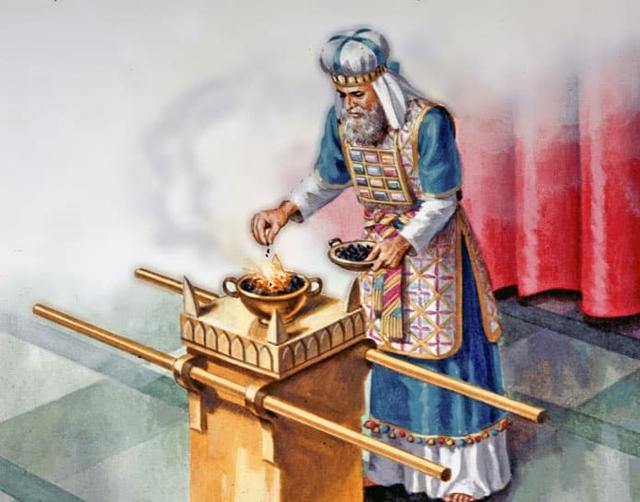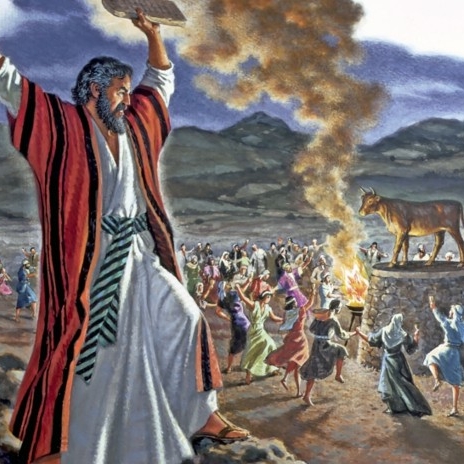Old
Testament - Exodus

Indeed, incense is referred to frequently
throughout both the Old and the New Testaments.
In both the Old and the New Testaments, smoke
from the incense is symbolic of the prayers of
the faithful rising up to heaven; e.g.:
"Let my prayer be
incense before you;
my uplifted hands an evening sacrifice."
(Psalm 141:2)
Smoke from incense in various Jewish and
Christian liturgies also serves as a further
reminder to the faithful of the presence of God
as He manifested Himself in various theophanies
throughout salvation history; e.g.:
"Mount Sinai was all wrapped in
smoke, for the
Lord came down upon it in fire. The
smokerose from it as though from a furnace, and the
whole mountain trembled violently."
(Exodus 19:18)
In particular, Exodus 30:1-10 and Exodus
30:34-38 provide wonderful details that the Lord
gave Moses for both constructing the altar of
incense, and how to prepare the incense itself;
e.g.:
"On it Aaron shall burn
fragrant
incense. Morning after morning, when he
prepares the lamps, and again in the evening
twilight, when he lights the lamps, he shall
burn incense. Throughout your generations
this shall be the established
incense offering
before the Lord. On this altar you shall
not offer up
any profane incense..."
(Exodus 30:7-9)
Of note is the admonition the Lord gives Moses
not to use incense for profane purposes. The
Lord again leaves Moses with similar admonitions
regarding the proper preparation and use of the
incense itself; i.e.
"This
incense
shall be treated as most sacred
by you. You may not make
incense
of a
like mixture for yourselves; you must treat it
as sacred to the Lord. Whoever makes an
incense
like this for his own enjoyment of
its fragrance, shall be cut off from his
kinsmen."
(Exodus 30:36-37)
Old Testament - Prophets

Recalling God's commands to Moses, prophets like
Isaiah, Jeremiah, Ezekiel and Hosea would later
chastise the Israelites sternly for burning
incense in a profane manner to false gods such
as Baal, Ashtarte, Moloch, Chemosh, etc. rather
than keeping it sacred and dedicated to God
alone; e.g.:
"Are you
to steal and murder, commit adultery and perjury, burn
incense
to Baal, go after strange gods that
you know not, and yet come to stand before me in
this house which bears my name, and say: "We
are safe; we can commit all
these abominations again?"
(Jeremiah 7:9-10)
Smoke from incense during liturgical services
(e.g. while singing the Sanctus at
mass) also calls to mind other theophanies such
as the prophet Isaiah's in which smoke
accompanied the presence of God. i.e.:
"Holy, holy, holy is
the LORD of hosts!" they cried to
one another.
"All the earth is filled with his glory!"
At the sound of that cry, the frame of
the door shook and the house was filled with smoke."
(Isaiah 6:3-4)
New Testament - Revelation

Then one of the four living creatures gave
to the seven angels seven golden bowls
filled with the wrath of God, who lives for ever
and ever. Rev. 15:7
In
several places, the New Testament continues
to draw our attention to the proper role incense
plays as representative of the prayers of the
faithful rising to heaven. A few examples are
listed below.
Luke:
"Once when he
[Zechariah]
was serving as priest in his division's turn
before God, according to the practice of the
priestly service, he was chosen by lot to enter
the sanctuary of the Lord to
burn incense.
Then, when the whole assembly of the people was
praying outside at the hour of the incense offering,
the angel of the Lord appeared to him, standing
at the right of the
altar of incense."
(Luke 1:8-11)
Hebrews:
"Now
[even]
the first covenant had regulations for worship
and an earthly sanctuary. For a tabernacle was
constructed, the outer one, in which were the
lamp-stand, the table, and the bread of
offering; this is called the Holy Place. Behind
the second veil was the tabernacle called the
Holy of Holies, in which were the
gold altar
of incense and
the ark of the covenant entirely covered with
gold."
(Hebrews 9:1-4)
Revelation:
"He came and received the scroll from the
right hand of the one who sat on the throne.
When he took it, the four living creatures and
the twenty-four elders fell down before the Lamb.
Each of the elders held a harp and
gold bowls
filled with incense,
which are the prayers of the holy ones. "
(Revelation 5:6-8)
REFERENCES
Confraternity of Christian Doctrine. The New
American Bible, (Iowa Falls: IA, World Bible
Publishers, Inc. 1991)